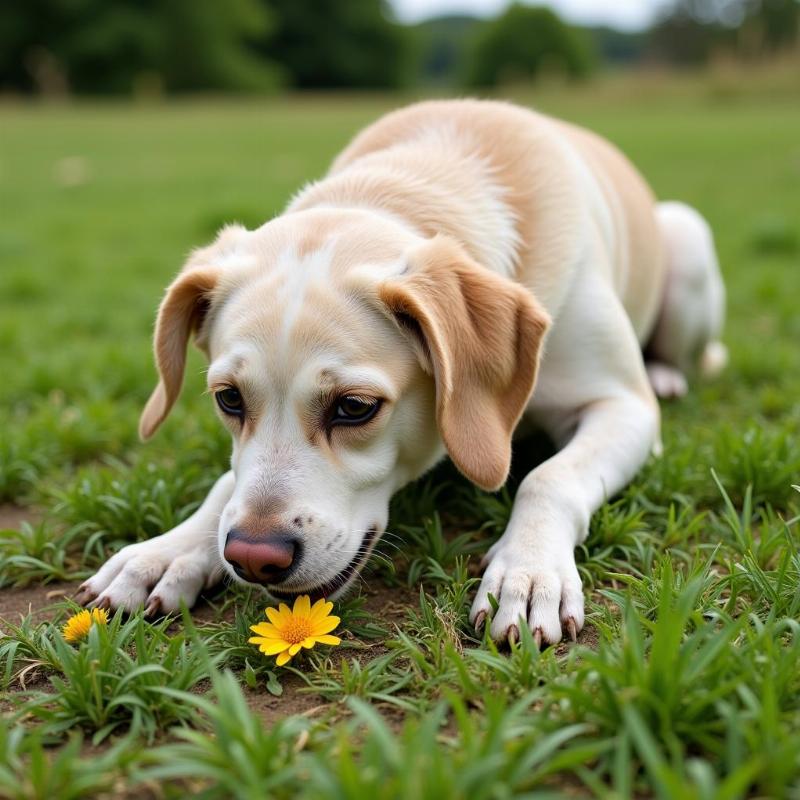Blanket flowers (Gaillardia spp.) add a splash of vibrant color to any garden, but are blanket flowers toxic to dogs? It’s a crucial question for dog owners who want to ensure their furry friends’ safety while enjoying a beautiful landscape. Understanding the potential risks of common garden plants is an essential part of responsible pet ownership.
Blanket Flowers and Canine Safety: Understanding the Risks
While blanket flowers are generally considered non-toxic to dogs, they can still cause mild gastrointestinal upset if ingested in large quantities. This is due to the presence of sesquiterpene lactones, compounds found in many plants of the Asteraceae family, to which blanket flowers belong. These lactones can cause irritation to the mouth, throat, and stomach, leading to symptoms like drooling, vomiting, and diarrhea.
Symptoms of Blanket Flower Ingestion in Dogs
If your dog ingests a small amount of blanket flower, you likely won’t see any symptoms. However, larger quantities can cause the following:
- Excessive drooling
- Vomiting
- Diarrhea
- Loss of appetite
- Lethargy
While these symptoms are usually mild and self-limiting, it’s always best to contact your veterinarian if you notice any unusual behavior after your dog has been around blanket flowers.
 Dog vomiting on grass
Dog vomiting on grass
Preventing Blanket Flower Ingestion
The easiest way to prevent blanket flower ingestion is to plant them in areas your dog can’t access. Consider using fencing, raised beds, or designated dog-free zones in your garden. Training your dog to avoid certain plants is also helpful, though it requires consistency and patience.
Alternatives to Blanket Flowers for Dog-Friendly Gardens
If you’re concerned about blanket flowers, plenty of other beautiful and dog-safe flowers can brighten your garden. Consider planting sunflowers, zinnias, snapdragons, or petunias. These vibrant blooms add color and texture without posing a threat to your furry companion.
Are Blanket Flowers Toxic to Dogs? FAQ
-
Are all parts of the blanket flower toxic to dogs? All parts of the blanket flower can cause mild irritation, but the flower heads contain higher concentrations of sesquiterpene lactones.
-
What should I do if my dog eats a blanket flower? Monitor your dog for any signs of gastrointestinal upset. If symptoms appear or you’re concerned, contact your veterinarian.
-
Can blanket flowers cause skin irritation in dogs? While less common, some dogs may experience skin irritation from contact with blanket flowers.
-
Are there any long-term effects of blanket flower ingestion in dogs? No, the effects are typically mild and short-lived.
-
Are there any dog breeds more susceptible to blanket flower toxicity? No, but puppies and dogs with pre-existing digestive issues may be more sensitive.
-
Are Gaillardia and blanket flowers the same? Yes, Gaillardia is the scientific name for blanket flowers.
Conclusion: Keeping Your Canine Companion Safe
While blanket flowers aren’t highly toxic to dogs, it’s important to be aware of the potential risks and take preventative measures. By understanding the symptoms, practicing responsible gardening, and knowing when to seek veterinary care, you can ensure your dog enjoys a safe and vibrant environment. Blanket flowers can still be a part of your landscape, but thoughtful planning is key to protecting your four-legged friend.
Beautdogs.us is your premier destination for all things dog-related in the US. We offer expert advice on dog breeds, care, and lifestyle, empowering you to provide the best possible care for your furry companion. From puppyhood to senior years, we’re here to help you navigate the joys and challenges of dog ownership. Connect with our experts today for personalized guidance and discover a world of resources designed to enhance your dog’s life. Email us at [email protected] or call us at +1 501-555-7529. Beautdogs.us – Your trusted source for expert dog care.